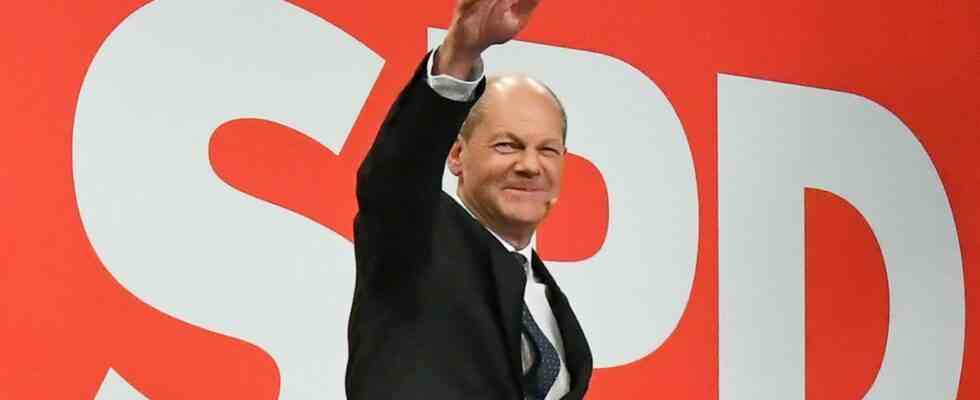A few days after winning the state elections in Lower Saxony, this book was right on the book tables. Thanks to its incumbent Stephan Weil, the SPD won despite moderate losses and can continue a political tradition in the country that has been social democratic almost continuously since 1946. Reason for this time diagnosis of Augsburg social and contemporary historian Dietmar Süss was Olaf Scholz’s “strange victory” in the 2021 federal election. Far behind in polls, the less than charismatic Hamburger rose to the surprise of his own party to become the celebrated Federal Chancellor.
Comrade trend is down, for decades
However, these positive swings hardly thwart the long downward trend since the 1970s; in percentage points, the SPD is back in the 1950s. It was seldom able to break through the structural supremacy of the Adenauer-Kohl-Merkel Union, and that was only because of its temporary personal and programmatic exhaustion. Comrade Trend has long since stopped supporting the Socialists.
This trend is not based on slogans such as “respect”, personalities, campaigns (“Schulz-Zug”) and opinion polls, but on changes in the medium- and long-term lines of conflict and division in society, which is less characterized by volatile moods and concepts of identity than of classes and strata. The double misunderstanding of social democracy, Dietmar Süss suggests in ten slim and easy-to-read chapters, was not only in Germany that with the shrinking of its proletarian base it turned to the climbers into the middle class, while maintaining the security promise of the welfare state, this then with radical Hartz reforms itself denied and nevertheless sticks to the denied rhetoric of progress.
The distrust of the descended
Suss, who does not hide his sympathies for the socio-moral milieu of the old social democracy, states that history is “overburdened”. A new social democratic decade (or even century, like a globally oriented study by the Friedrich-Ebert-Foundation) he fortunately does not exclaim.
Because precarious workers, single parents, recipients of transfer payments and other vulnerable groups had little to do with the Scharping-Schröder-Gabriel-Schulz-SPD. They stayed away from the ballot boxes and sometimes defected to the left and then, especially in East Germany, to the AfD. They no longer believe the SPD that everything will get better in the end; They distrust Willy Brandt’s “dare more democracy” because they hardly feel represented any more, and also his East German and détente policies, which were able to whitewash inner-party conflicts for a long time. The mantra of the SPD that everything can be achieved through education for all is refuted on a daily basis.
An election evening according to Willy Brandt’s taste: statue of the former chairman and SPD chancellor on September 26, 2021.
(Photo: Regina Schmeken)
This burden of history, whose promises of progress and solidarity are dogmatically upheld, prevents a hands-on climate and environmental policy, as well as a foreign and security policy that is “in keeping with the times”. Pandemic politics typifies the back and forth. And that a social-democratic chancellor is his authority at the head of the “progress coalition” he proclaimedand which in turn does so hesitantly, appears as a symbol for the fact that the SPD’s ephemeral comeback has not yet really advanced German politics.
Dietmar Suss, The Strange Victory. The comeback of the SPD and what it means for Germany. Verlag CH Beck Verlag, Munich 2022. 223 pages, 18 euros.
(Photo: CH Beck)
The author refrains from giving advice on how that could change and how the SPD could possibly get back on the offensive. Suess hints that he would use the word “class conflicts” and hopes that the party will initiate a democracy initiative. That is honorable, but fails to recognize what social democracy has lost in its balancing act between “climbers” and “those left behind”: climate change and species extinction are destroying their industrial base, the return of imperial politics their peace and detente policies and demographic change their appeal for younger generations and homines novi. The promise to classes popularthey could follow the path of increasing wealth and self-realization and meritocratically catching up with the top ten percent, has reached objective barriers.
Most social democrats thus conjure up yesterday’s world, while tomorrow’s world demands extremely painful corrections. And that is exactly where the SPD’s paradoxical chance could lie: If they – rather counter coeur – created a “protective technocracy” (Philipp Staab) that relieves the climbers of the pressure to perform and gives those who fall down more security. The multiple crises of the present point exactly in this direction.
Claus Leggewie is a political scientist and holds the Ludwig Börne Professorship at the Justus Liebig University in Gießen.

